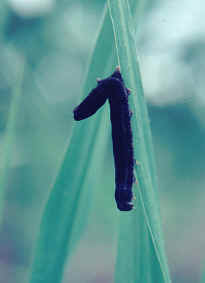Biological Control of African armyworm
African armyworm baculovirus (SpexNPV)
African armyworms play host to a highly specific baculovirus: Spodoptera exempta nucleopolyhedrovirus (SpexNPV).
Larvae become infected when they ingest vegetation contaminated with virus occlusion bodies (OBs). The OBs break down in the alkaline conditions of the insect's mid-gut and the virus replicates within host cells, generating millions of new OBs. Within 3-5 days the larvae die and they exhibit a characteristic inverted-V shape as they hang from vegetation (see photo). Soon, their cuticle (skin) ruptures, liberating the OBs on the vegetation where they can infect conspecifics.
Although extensive epidemics of SpexNPV often cause armyworm populations to crash (causing up to 98% mortality; Rose et al. 2000), these natural disease outbreaks are usually far too late in the armyworm seasonal cycle to prevent major crop damage (see below). Ongoing research on the biology, ecology and genetics of SpexNPV is trying to assess its potential use as a microbial pesticide.
 SpexNPV-infected armyworm larvae on pasture. photo (c) Bill Page
SpexNPV-infected armyworm larvae on pasture. photo (c) Bill Page
